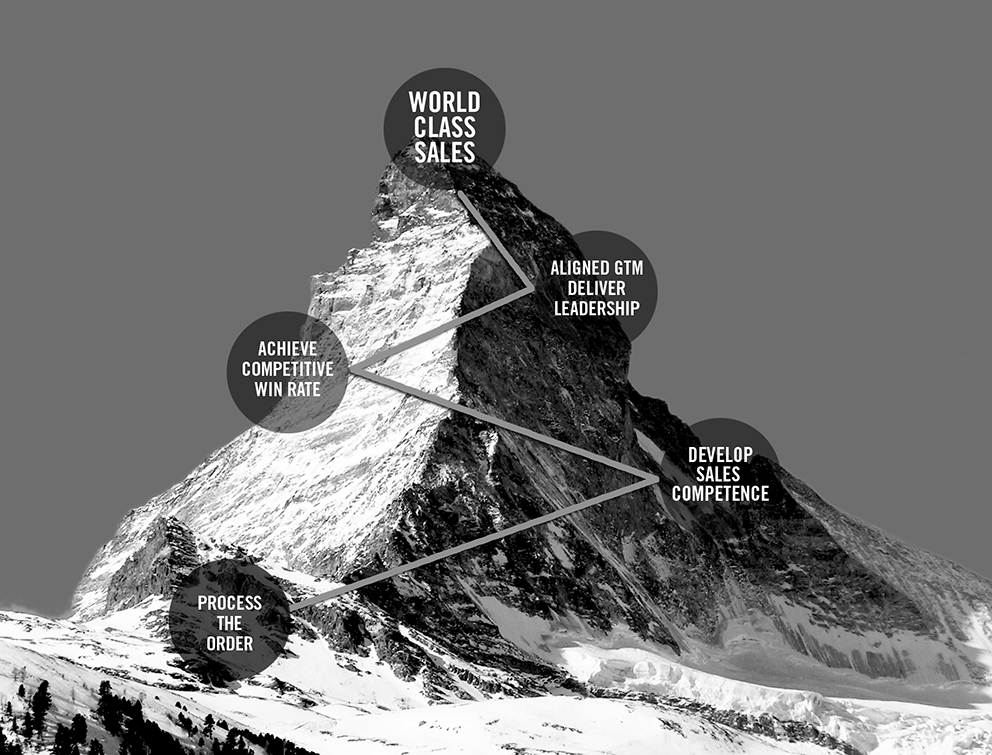There are 86 separate activities that your organisation will need to complete in order to become world class at sales. Seriously. 86. That’s the magic number. These activities fit within 8 categories that will elevate you through the 5 levels of sales success. Sounds complicated, doesn’t it? Well, the good news is that you’ll only need to establish competence in small number of these activities to raise your organisation well above the average. That’s no excuse not to do all 86 by the way.
The eight categories that matter:
These categories are determined firstly by dealing with the overall context of the firm or division as it relates to sales.
What is the Market position?
1. Is there Executive Alignment to the outcome?
2. Is there a robust approach to Sales Management?
3. Is the process of running Deal Pursuits in place?
And secondly by looking at the ability for individual departments or people to perform efficiently and effectively.
5. Do we have the right Offers for the market?
6. Are the skills and competencies in place within the Sales Organisation?
7. Do the Solutions work and are they repeatable?
8. Are other areas of Functional Expertise (finance , legal, HR, etc)
tuned to sales or just gatekeepers of success?
The five levels of sales performance:
1. Processing the order.
2. Basic sales competence built on individual skills.
3. Establish system to achieve competitive win rate. Grow at the market rate.
4. Align your resources on a go-to-market model & perform upper quartile for market.
5. World class selling. Win 80%+ of new pursuits.
At the levels of GTM and World Class Sales the organisation will already be ahead of the competition.
Profitability can be tuned by selecting the key deals to pursue. I am often asked why I am satisfied with a win-rate in the 80-90% range. Of course, with these tools, it is possible to get to near 100%, however in my experience, at these higher levels firms start to sacrifice certain disciplines, particularly profitability and deliverability. Therefore the win rate is not sustainable over multiple years.
For the vast majority of firms, they have to sell. And sell well.
Now take a deep breath, because here comes one of the longest
(and potentially most valuable) lists you’ll ever see on the internet.
The 86 steps.
| Market Positioning | Change & Pgm management plan & capability | |||
| Negotiation strategy | ||||
| Company alignment to strategic position | ||||
| Customer responsiveness | ||||
| Executive relationship management | ||||
| Alliances to win | ||||
| Liability and Risk | ||||
| Deal size | ||||
| Market Position model vision | ||||
| Land expand, whale hunt | ||||
| Sales system clarity | ||||
| Market intelligence | ||||
| Targetting | ||||
| Size of sales force | ||||
| Sales Org fit for purpose | ||||
| Sales capacity management | ||||
| Strategic pipeline management | ||||
| Exec Alignment | Willingness to qualify out | |||
| Governance Adherence | ||||
| Executive sponsorship for deal | ||||
| Must win meaning | ||||
| Resource availability | ||||
| Sales culture, focus | ||||
| Company strategic alignment | ||||
| Management reporting | ||||
| Constancy of purpose rev tcv profit | ||||
| Cost of sales ROI measure (validate economics) | ||||
| Big deal team | ||||
| Sales Management | Sales Performance | |||
| Coaching as a process | ||||
| TPA relationships and insight | ||||
| Client care – referencability | ||||
| Client buying process understanding | ||||
| Close planning | ||||
| Sales competence | ||||
| Sales forecasting accuracy | ||||
| Sales time perspective – short term long term | ||||
| Plan to make plan A,B | ||||
| Lead generation | ||||
| Cost of sale | ||||
| Territory design and tracking | ||||
| Win loss analysis. Feedback & learning process | ||||
| Sales org experience levels and maturity | ||||
| Sales planning. Big bets | ||||
| Sales force performance | ||||
| Sales attrition (forced and unforced) | ||||
| Territory Planning | ||||
| Deal Process + Management + Bids | Price to Win | |||
| Automatic proposal production | ||||
| Qualification process | ||||
| Deal marketing | ||||
| Governance clarity | ||||
| Team Selection | ||||
| Resource suitability | ||||
| Bid production | ||||
| Bid costs . Dedicated vs leveraged teams | ||||
| Sales process clarity | ||||
| Sales Competence | Sales startegy development | |||
| Competitor insight (general to specific) | ||||
| Competitor tactics traps etc | ||||
| War gaming | ||||
| General relationship management | ||||
| Sales hubs, centre of excellence | ||||
| Qualification skill | ||||
| Solution Management | Solution quality overall | |||
| Solution design , technical excellence | ||||
| Build to run | ||||
| Standard architectures | ||||
| Sales support competence. Industry knowledge and Expertise | ||||
| Offer Management | Value propositions | |||
| Unique differentiators, IP | ||||
| Product quality | ||||
| Product definition clarity | ||||
| Service definition clarity | ||||
| Product and service differentiation | ||||
| Playbooks | ||||
| Functional Expertise | Brand positioning | |||
| Contracting excellence | ||||
| Risk assessment and management | ||||
| Financial deal engineering | ||||
| Cost modelling | ||||
| Commercial competence | ||||
| Due diligence | ||||
| Compensation plan fit for purpose | ||||
| Lead sourcing | ||||
If you’ve got this far, then you’re already shown the kind of stamina,
resolve and commitment required to gain an advantage.
Go and get ’em.

